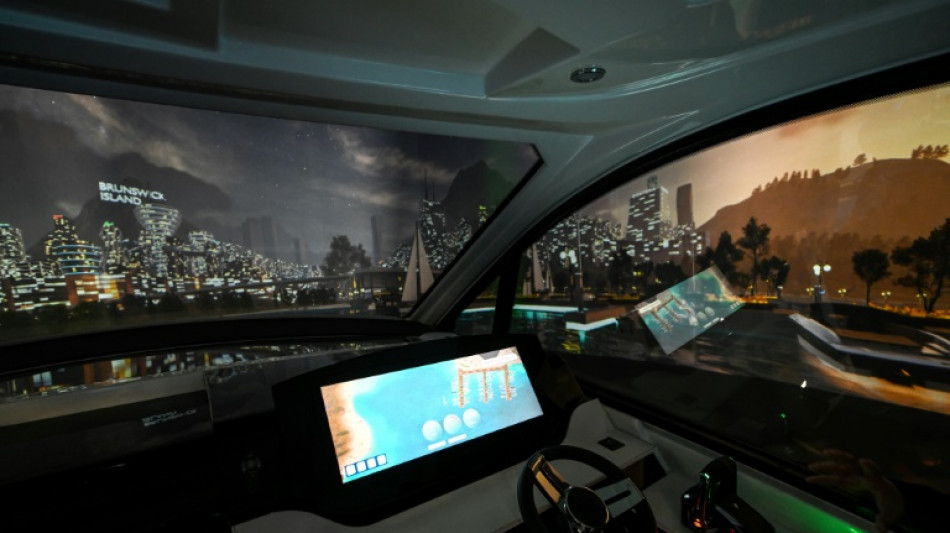
-
 Hungry Sabalenka ready for more Slam success
Hungry Sabalenka ready for more Slam success
-
Mass jailbreak in Mozambique amid post-election unrest

-
 Azerbaijani jet crashes in Kazakhstan, killing 38
Azerbaijani jet crashes in Kazakhstan, killing 38
-
Bridges outduels Wembanyama as Knicks beat Spurs

-
 2004 Indian Ocean tsunami: what to know 20 years on
2004 Indian Ocean tsunami: what to know 20 years on
-
Asia to mourn tsunami dead with ceremonies 20 years on

-
 Syrians protest after video of attack on Alawite shrine
Syrians protest after video of attack on Alawite shrine
-
Russian state owner says cargo ship blast was 'terrorist attack'

-
 38 dead as Azerbaijani jet crashes in Kazakhstan
38 dead as Azerbaijani jet crashes in Kazakhstan
-
Crisis-hit Valencia hire West Brom's Corberan as new boss

-
 Suriname ex-dictator and fugitive Desi Bouterse dead at 79
Suriname ex-dictator and fugitive Desi Bouterse dead at 79
-
35 feared dead as Azerbaijani jet crashes in Kazakhstan

-
 Pope calls for 'arms to be silenced' in Christmas appeal
Pope calls for 'arms to be silenced' in Christmas appeal
-
Syria authorities say torched 1 million captagon pills

-
 Pope calls for 'arms to be silenced' across world
Pope calls for 'arms to be silenced' across world
-
32 survivors as Azerbaijani jet crashes in Kazakhstan

-
 Pakistan air strikes kill 46 in Afghanistan, Kabul says
Pakistan air strikes kill 46 in Afghanistan, Kabul says
-
Liverpool host Foxes, Arsenal prepare for life without Saka

-
 Japan FM raises 'serious concerns' over China military buildup
Japan FM raises 'serious concerns' over China military buildup
-
Pope's sombre message in Christmas under shadow of war

-
 Zelensky condemns Russian 'inhumane' Christmas attack on energy grid
Zelensky condemns Russian 'inhumane' Christmas attack on energy grid
-
Sweeping Vietnam internet law comes into force

-
 Pope kicks off Christmas under shadow of war
Pope kicks off Christmas under shadow of war
-
Catholics hold muted Christmas mass in Indonesia's Sharia stronghold

-
 Japan's top diplomat in China to address 'challenges'
Japan's top diplomat in China to address 'challenges'
-
Thousands attend Christmas charity dinner in Buenos Aires

-
 Demand for Japanese content booms post 'Shogun'
Demand for Japanese content booms post 'Shogun'
-
As India's Bollywood shifts, stars and snappers click

-
 Mystery drones won't interfere with Santa's work: US tracker
Mystery drones won't interfere with Santa's work: US tracker
-
Djokovic eyes more Slam glory as Swiatek returns under doping cloud

-
 Australia's in-form Head confirmed fit for Boxing Day Test
Australia's in-form Head confirmed fit for Boxing Day Test
-
Brazilian midfielder Oscar returns to Sao Paulo

-
 'Wemby' and 'Ant-Man' to make NBA Christmas debuts
'Wemby' and 'Ant-Man' to make NBA Christmas debuts
-
US agency focused on foreign disinformation shuts down

-
 On Christmas Eve, Pope Francis launches holy Jubilee year
On Christmas Eve, Pope Francis launches holy Jubilee year
-
'Like a dream': AFP photographer's return to Syria

-
 Chiefs seek top seed in holiday test for playoff-bound NFL teams
Chiefs seek top seed in holiday test for playoff-bound NFL teams
-
Panamanians protest 'public enemy' Trump's canal threat

-
 Cyclone death toll in Mayotte rises to 39
Cyclone death toll in Mayotte rises to 39
-
Ecuador vice president says Noboa seeking her 'banishment'

-
 Leicester boss Van Nistelrooy aware of 'bigger picture' as Liverpool await
Leicester boss Van Nistelrooy aware of 'bigger picture' as Liverpool await
-
Syria authorities say armed groups have agreed to disband

-
 Maresca expects Man City to be in title hunt as he downplays Chelsea's chancs
Maresca expects Man City to be in title hunt as he downplays Chelsea's chancs
-
Man Utd boss Amorim vows to stay on course despite Rashford row

-
 South Africa opt for all-pace attack against Pakistan
South Africa opt for all-pace attack against Pakistan
-
Guardiola adamant Man City slump not all about Haaland

-
 Global stocks mostly higher in thin pre-Christmas trade
Global stocks mostly higher in thin pre-Christmas trade
-
Bethlehem marks sombre Christmas under shadow of war

-
 NASA probe makes closest ever pass by the Sun
NASA probe makes closest ever pass by the Sun
-
11 killed in blast at Turkey explosives plant


At CES, sailor-less ships head to port on AI wave
Whether on pleasure yachts or deep-sea cargo ships, AI-backed navigation assistance and autonomy are helping captains set sail for sunsets or simply moor in a port scratch-free.
At the CES technology show in Las Vegas, boat builders are putting a big focus on technologies and artificial intelligence that make it easier for both the weekend yachtie and seasoned sailor to head out to sea.
"On the water, there is wind, currents, sometimes waves, the boat does not stay in place, you always have to compensate," said Johan Inden, president of the marine business at Swedish company Volvo Penta.
For more than ten years, the company's boats have helped mariners maneuver using a simple joystick that holds a ship in position or thrusts it sharply to the right or left.
Volvo Penta unveiled a prototype in 2018 that was capable of letting the boat dock by itself, but customers weren't ready to park their ships at the click of a button, Inden said.
Instead, the company developed the docking assistance system "that gives the captain a certain level of control" when mooring the boat, a moment "that remains one of the most stressful in sailing."
In general, the idea is to improve "safety, comfort, relaxation" and eventually make boating more accessible, he said.
A boat prototype by US company Brunswick offers the best trajectory to enter a port, avoid collisions and finds available places to dock a boat and does the job without human intervention.
Another software program, offered by Hyundai's Avikus, can help maximize pleasure at sea.
One setting will ensure that the boat is ideally positioned for sunbathing or will find the best spot to enjoy the sunset and get there in time to see it.
The goal, according to company executive Carl Johansson, is to provide fuel savings, safety, and "peace of mind."
- 'Reduce crew' -
For merchant mariners, autonomous sailing is in test phase.
In Norway, an autonomous electric cargo ship has been transporting fertilizer from factory to port since last year, with the aim of reducing truck traffic.
While in Japan, an automated full-sized ferry has been in operation between two islands since last year, though for now with a crew on board.
If the reality of ships entirely without human sailors remains elusive, many navigation tools can provide valuable help, in ports or to calculate the best route according to weather.
A computer guided journey "provides much more reliable transportation," said John Cross of Memorial University in Canada.
HD Hyundai, which at CES unveiled a project to collect and analyze shipping data, said that its software will slow a ship's speed if the destination port is congested, thereby reducing fuel consumption.
Autonomy tools can also be useful in helping with maintenance by monitoring the condition of engines or propellers.
In the long run, the goal of companies is to "reduce the number of crew members," said John Cross. They may see it as a way to save money, but also to reduce risks as accidents on board are still frequent.
It is also a way of dealing with the ageing of professional seafarers and difficulties in recruiting.
The growth of work on autonomous navigation has recently been helped by the decision of the International Maritime Organization (IMO) to work on setting rules, said Rudy Negenborn of Delft University in the Netherlands.
It is still forbidden to operate an autonomous boat in international waters and new regulations are not expected before 2028.
The technologies also need refining to enhance safety, reduce energy consumption and determine which are the best sensors and what to do if they fail, said Negenborn.
In any case, "there will always be a human somewhere," he said. Whether it's a sailor following a computer on board or a supervisor on land managing several boats.
D.Sawyer--AMWN


